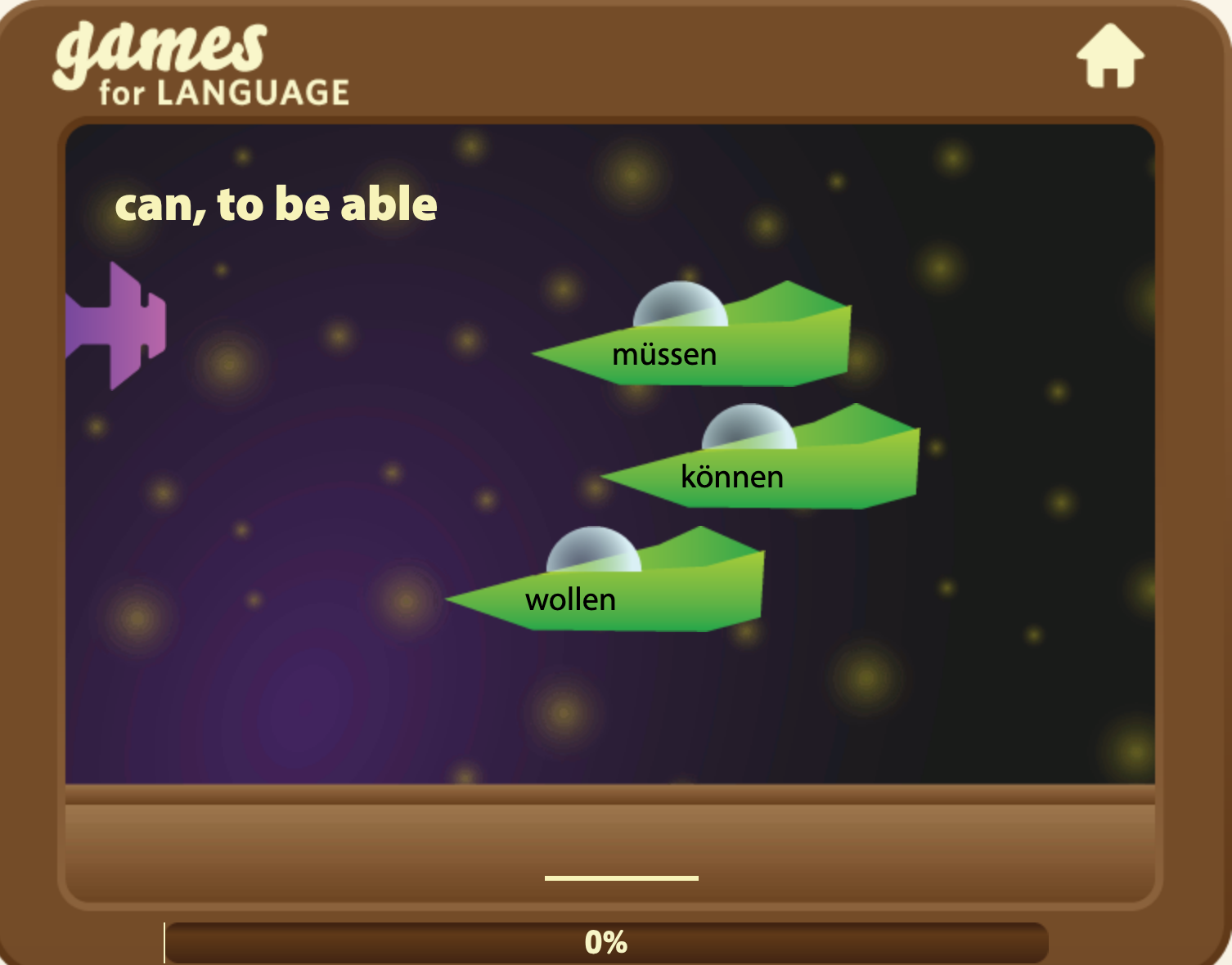How to Use the German Modal Verb "können"
 No better way to practice the German Modal Verb "können" than with one of Gamesforlanguage's most popular games: the German Modal Shoot.
No better way to practice the German Modal Verb "können" than with one of Gamesforlanguage's most popular games: the German Modal Shoot.
It's a three-minute interactive online game that gives you a quick practice of the basic forms of the German modals.
What are Modal Verbs?
Modal Verbs are helping verbs, also called auxiliary verbs. They add a chunk of meaning to the main verb of a sentence.
In conversations they show up all the time.
German has six modals. They express ability, necessity, obligation, permission, a wish, etc.
They are:
- können (be able, can),
- müssen (to have to, must),
- sollen (shall, ought to),
- dürfen (be permitted, may),
- wollen (to want) and
- mögen (to like).
So for example, take the sentence: Ich arbeite heute ( I'm working today) and add the modals:
I'm working today) and add the modals:
- Ich kann heute arbeiten. (I can work today.)
- Ich muss heute arbeiten. (I have to work today.)
- Ich soll heute arbeiten. (I ought to work today.)
- Ich darf heute arbeiten. (I'm allowed to work today.)
- Ich will heute arbeiten. (I want to work today.)
But: Ich möchte heute arbeiten. (I would like to work today.)
Arggh, here you would use the (subjunctive) "would" form in German: "möchte", not "mag".
(The present forms of "mögen" can't be used with an infinitive verb.)
The modal "können" (can, to be able) is a very useful helping verb.
But its changing forms and conjugations often make it frustrating for the English-speaking learner, who is only used to “can” and “could”.
German Modal Verb "können" - Present Tense
In the Present singular form, "können" changes its stem vowel from "ö" to "a":
- ich kann (I can)
- du kannst (you[fam.] can)
- er, sie, es kann (he, she, it can)
- wir können (we can)
- ihr könnt (you-all can)
- sie, Sie können - they, you[form.] can
Below are examples of different ways you can use it.
"Können" - for a polite offer or request:
- Ich kann Ihnen helfen. (I can help you.)
- Können Sie/Kannst du mir helfen? (Can you help me?)
- Ja, das kann ich. (Yes, I can.)
"Können" to express know-how:
- Er kann Gitarre spielen. (He can play the guitar.)
- Kannst du Deutsch? (Do you know German? i.e. Are you able to speak German?)
- Ja, aber ich kann kein Englisch. (Yes, but I don't know any English.)
"Können" to express possibility:
- Das kann doch nicht wahr sein. (Surely that can't be true.)
- Kann das wirklich stimmen? (Is that really correct?)
- Ja ja, heute kann's regnen. (Yes yes, today it may rain.)
"Können" to ask or give permission:
- Kann ich jetzt gehen? (Can I go now?)
- Nein, das können Sie nicht. (No, you can't. [formal])
- Ja, du kannst. (Yes, go ahead. [familiar])
Did you get all this? If so try this Quiz #1 for "können" on our sister site Lingo-Late.
Or, if you are looking for a fun German Quick Game: Practice "Können"
Modal Verb "können" - Simple Past Tense
Unfortunately the Simple Past is not that simple for English speakers, who conveniently use "could" for all persons.
In German, the stem drops the umlaut, and is "konn-" for all persons. But you still need to add the so-called "weak" personal endings for the Simple Past:
- ich konnte (I could)
- du konntest (you could)
- er, sie, es konnte (he, she, it could)
- wir konnten (we could)
- ihr konntet (you-all could)
- sie, Sie konnten (they, you could)
Past situations:
- Sie konnte mich nicht verstehen. (She couldn't understand me.)
- Ich war in Deutschland aber ich konnte kein Deutsch. (I was in Germany but I didn't know German.)
- Warum konntest du mich nicht anrufen? (Why couldn't you call me?)
For making excuses:
The Simple Past of "können" is also perfect for making excuses, especially when you add "leider" (unfortunately)
- Ich konnte leider nicht anrufen. (Unfortunately, I couldn't call .)
- Leider konnten wir nicht früher kommen. (Unfortunately, we couldn't come earlier.)
- Mein Mann konnte leider seine Autoschlüssel nicht finden. (Unfortunately, my husband couln't find his car keys.)
Modal Verb "können" - Imperfect Subjunctive Tense
This unapproachable-sounding tense is actually easier, if you remember the Simple Past forms above. You just add an umlaut to every Simple Past form.
- ich könnte - I could, would be able
- du könntest - you could, would be able
- er, sie, es könnte - he, she it could, would be able
- wir könnten - we could, would be able
- ihr könntet - you-all could, would be able
- sie, Sie könnten - they, you could, would be able
Use this tense for polite requests (with or without "bitte"):
- Könnten Sie mir bitte sagen ... (Could you please tell me ...)
- Könntest du mir das Salz geben? (Could you pass me the salt?)
- Könnte ich etwas anderes bestellen? (Could I order something different?
Make a polite suggestion:
- Wir könnten jetzt gehen. (We could go now. Let's go now.)
- Ich könnte dich morgen anrufen. (I could call you tomorrow.)
- Du könntest auch später gehen. (You could also go later.)
Express a tentative possibility:
- Das könnte teuer werden. (That could get expensive.)
- Es könnte morgen schneien. (It could snow tomorrow.)
- Wir könnten den 8Uhr Zug nehmen. (We could take the 8 o'clock train.)
Related verbs: können and kennen
Hearing the difference between “können” and “kennen” is often a challenge for the beginning German learner.
We've seen that the auxiliary verb "können" means "to be able, to know how".
On the other hand, the verb "kennen", means "to know, be acquainted with", referring to a person, a place, a song, a book, etc.
You say:
- Peter und ich, wir kennen uns. (Peter and I, we know each other.)
- Ich kenne Helsinki noch nicht. (I don't know Helsinki yet.)
- Kennen Sie London gut? (Do you know London well?)
- Kennst du dieses Buch? (Do you know this book?)
One clue to know whether you hear a form of “können” or one of “kennen” is to listen for another verb: In most cases, the auxiliary verb “können” needs another verb. (But as you've seen above there are exceptions.)
So, go ahead and use "können" as much as you can.
Ich kenne dich nicht, aber ich weiß, du kannst es. (I don't know you, but I know that you can do it.)
